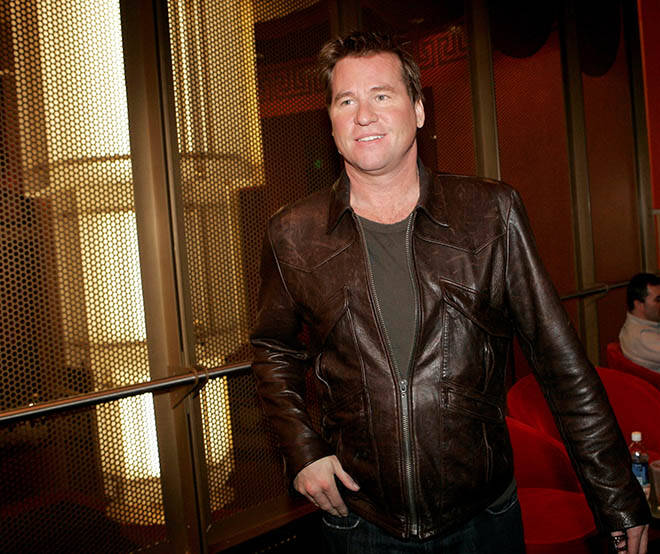Shaffer shakes off post-‘Letterman’ blues with new album, tour

ASSOCIATED PRESS
Victoria Shaffer, left, and Paul Shaffer arrive at the 58th annual Grammy Awards at the Staples Center in Los Angeles on Feb. 15.
NEW YORK — The last time Paul Shaffer went on a full-fledged rock ‘n’ roll tour, it was 1980 and he was playing with the Blues Brothers. What he remembers most about the experience, more than any hedonistic misadventures with John Belushi and Dan Aykroyd, is traveling from city to city with a band of veteran R&B musicians on a fragile, twin-engine propeller plane.
“We’re with contemporaries of Buddy Holly and Otis Redding,” Shaffer recalled recently in his dry delivery. “Somebody said, let’s at least write a song about an air disaster so that our families will have some sort of annuities.”
He began to sing the lyrics from “Air Disaster,” a preflight song the entourage would perform to ward off evil spirits:
Rock tragedy
All they had to do was spend a couple more g’s
Rock tragedy
Don't miss out on what's happening!
Stay in touch with breaking news, as it happens, conveniently in your email inbox. It's FREE!
Including several members of the MG’s
That was half a lifetime ago for Shaffer, 67, who came from Fort William, Ontario, to New York in hopes of becoming a great session musician. Instead, he spent more than 30 years alongside David Letterman as his wisecracking sidekick, keyboardist and bandleader on NBC’s “Late Night” and CBS’s “Late Show.”
Now, nearly two years after Letterman stepped down from “Late Show” in May 2015, Shaffer is about to step out with his first major post-TV project. On March 17 Sire Records will release a self-titled album from Shaffer and his longtime colleagues, who are once again calling themselves the World’s Most Dangerous Band (as they did on NBC).
It is an album full of the 1960s-era rock and soul that Shaffer grew up worshipping, one that features special guests like Bill Murray, his friend and comedy collaborator of more than 40 years. Shaffer and the band will promote the record with a live tour — the first that many of them will have played on in decades.
Making this record has provided Shaffer the opportunity to reconnect with the modest musical dreams he had before becoming an unlikely television star, to play the music he loves best and to stave off inertia in a period when it was expected he might not do anything at all.
“It didn’t take me long to figure out I wasn’t happy doing that,” he said, speaking from the apartment he keeps near Lincoln Center. “While I still can, let me rock. Maybe that should be the title of the tour.”
OVER SOME afternoon biscotti, Shaffer, an avuncular man who still uses words like “groovy” and “swinging” quite sincerely, and whose cellphone ringtone plays “It’s Raining Men” (the hit song he and Paul Jabara wrote for the Weather Girls), spoke about his life after “Late Show.”
Despite all the free time he had to spend with his wife and two children, Shaffer felt untethered by the absence of a daily gig.
“Inside, I said to myself, ‘That was fabulous, now you can do other things — enjoy your life,’” he recalled. “I got depressed right away. I wasn’t interested in doing that.”
In his time on “Late Night” and “Late Show,” Shaffer was more than just an all-knowing one-man jukebox; he was the host’s reliable barometer of what was normal, what was askew and what was OK to laugh at.
“He was so much better at his job than I was at my job,” Letterman said in an interview. “If something was going crazy, all I had to do was look behind the guest’s head at Paul, and I could see that Paul sensed the same problem that I sensed. We would know, yeah, the engine has broken.”
(As Shaffer said, he saw his role in these interactions as, “I had to be there, ready to react musically or with a response, or else risk that question, ‘Can you hear me?,’ if I wasn’t quick with it.”)
For Shaffer, his years with Letterman vastly exceeded his youthful aspirations of playing music in New York, a dream cultivated by his time spent listening to American pop groups and the songs of Brill Building composers.
WILL LEE, the bassist and another charter member of the World’s Most Dangerous Band, said Shaffer’s greatest skill was “his diplomacy as a human that allowed him to navigate the waters of a guy like Dave Letterman.”
“Dave himself was looking for a persona,” Lee said, “and Paul not only helped him feel comfortable within his persona, but helped him find it along the way.”
Felicia Collins, the guitarist and singer who played with Shaffer’s CBS Orchestra for nearly 22 years, said the job offered “every single thing you could dream of wishing to do in your career as a musician.”
When that job ended, Collins said: “It just felt like there’s nowhere else to go after that. I was depressed for months. I couldn’t watch television. I couldn’t talk to people. And then my mother said, ‘Get out there — you can’t just look like you dropped off the face of the earth.’ And she was right.”
Shaffer said the fog of his own post-“Late Show” malaise began to lift when he was approached by Seymour Stein, the chairman and co-founder of Sire Records, to make an album for the label. “I cheered up right away — I wasn’t depressed anymore,” he said.
The 12 tracks on the album offer a mix of some of Shaffer’s favorite classic rock: a cover of Timmy Thomas’ “Why Can’t We Live Together” sung by Darius Rucker; a new song, called “Happy Street,” featuring jazzy vocals from Murray, his old “SNL” scene partner, that arrived with an animated video depicting the pair on a gleeful stroll. Shaffer sings on an updated version of the Latin soul song “Yeh Yeh,” popularized by Georgie Fame and the Blue Flames. (The lyric “And have some supper and let the evening pass by/By playing records besides a groovy hi-fi” becomes “And have some dinner, and since we’ve got time to kill/We turn the phone off, so we can Netflix and chill.”)
Richard Gottehrer, the veteran songwriter (“My Boyfriend’s Back”; “I Want Candy”) and Sire Records co-founder who produced the album, said it was Shaffer’s tribute to an era and a sound that fundamentally changed the musician’s life.
“It was the spirit of that music that got him out of a small town in Canada and made him think, gee, I don’t have to follow in my father’s footsteps and be a lawyer,” Gottehrer said.
SHAFFER AND his band mates will begin their tour in April, knowing that it will be a different, better-behaved take of his time on the road with the Blues Brothers. (“This will be a drug-free version of that,” Lee said.)
It may not be the kind of music that moves units by the millions anymore, Shaffer said, but then again, what does? “It kind of takes the pressure off,” he said. “‘Well, nobody’s selling records unless you’re Adele.’ I’m not Adele. Nobody expects me to really sell this thing.”
On this itinerary, Shaffer is likely to be in bed at a reasonable hour after each show, and this time he’s flying commercial. Still he can’t help feeling a little wistful about the airborne deathtrap that carried him around the country the last time.
“It was good to have your own plane,” he said. “As rickety as it was, it would take off as soon as we boarded.”
© 2017 The New York Times Company




